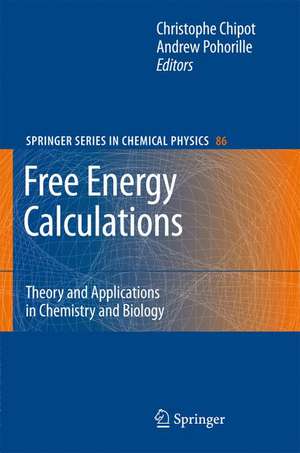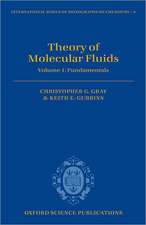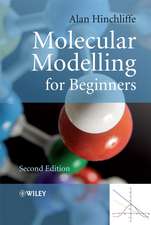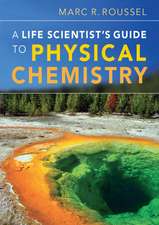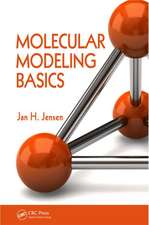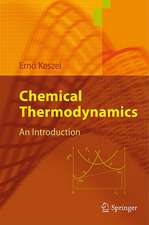Free Energy Calculations: Theory and Applications in Chemistry and Biology: Springer Series in Chemical Physics, cartea 86
Editat de Christophe Chipot, Andrew Pohorilleen Limba Engleză Hardback – 8 ian 2007
This volume sets out to present a coherent and comprehensive account of the concepts that underlie different approaches devised for the determination of free energies. The reader will gain the necessary insight into the theoretical and computational foundations of the subject and will be presented with relevant applications from molecular-level modelling and simulations of chemical and biological systems. Both formally accurate and approximate methods are covered using both classical and quantum mechanical descriptions. A central theme of the book is that the wide variety of free energy calculation techniques available today can be understood as different implementations of a few basic principles.
The book is aimed at a broad readership of graduate students and researchers having a background in chemistry, physics, engineering and physical biology.
| Toate formatele și edițiile | Preț | Express |
|---|---|---|
| Paperback (1) | 2093.43 lei 6-8 săpt. | |
| Springer Berlin, Heidelberg – 9 aug 2007 | 2093.43 lei 6-8 săpt. | |
| Hardback (1) | 2100.21 lei 6-8 săpt. | |
| Springer Berlin, Heidelberg – 8 ian 2007 | 2100.21 lei 6-8 săpt. |
Din seria Springer Series in Chemical Physics
- 20%
 Preț: 585.29 lei
Preț: 585.29 lei - 15%
 Preț: 643.00 lei
Preț: 643.00 lei - 15%
 Preț: 635.96 lei
Preț: 635.96 lei - 18%
 Preț: 953.03 lei
Preț: 953.03 lei - 15%
 Preț: 644.63 lei
Preț: 644.63 lei - 15%
 Preț: 638.43 lei
Preț: 638.43 lei - 15%
 Preț: 649.22 lei
Preț: 649.22 lei - 15%
 Preț: 647.40 lei
Preț: 647.40 lei - 15%
 Preț: 638.89 lei
Preț: 638.89 lei - 15%
 Preț: 652.31 lei
Preț: 652.31 lei - 15%
 Preț: 638.43 lei
Preț: 638.43 lei - 15%
 Preț: 637.13 lei
Preț: 637.13 lei - 18%
 Preț: 952.57 lei
Preț: 952.57 lei - 18%
 Preț: 947.85 lei
Preț: 947.85 lei - 15%
 Preț: 636.45 lei
Preț: 636.45 lei - 15%
 Preț: 649.87 lei
Preț: 649.87 lei - 18%
 Preț: 953.65 lei
Preț: 953.65 lei - 18%
 Preț: 894.03 lei
Preț: 894.03 lei - 15%
 Preț: 647.27 lei
Preț: 647.27 lei - 18%
 Preț: 1249.00 lei
Preț: 1249.00 lei - 15%
 Preț: 646.30 lei
Preț: 646.30 lei - 18%
 Preț: 954.14 lei
Preț: 954.14 lei - 24%
 Preț: 1226.80 lei
Preț: 1226.80 lei - 18%
 Preț: 961.72 lei
Preț: 961.72 lei - 18%
 Preț: 1002.31 lei
Preț: 1002.31 lei - 24%
 Preț: 647.23 lei
Preț: 647.23 lei - 18%
 Preț: 888.49 lei
Preț: 888.49 lei - 18%
 Preț: 908.04 lei
Preț: 908.04 lei - 15%
 Preț: 641.38 lei
Preț: 641.38 lei - 15%
 Preț: 585.40 lei
Preț: 585.40 lei - 15%
 Preț: 639.90 lei
Preț: 639.90 lei - 18%
 Preț: 897.02 lei
Preț: 897.02 lei
Preț: 2100.21 lei
Preț vechi: 2561.23 lei
-18% Nou
Puncte Express: 3150
Preț estimativ în valută:
401.87€ • 418.77$ • 332.75£
401.87€ • 418.77$ • 332.75£
Carte tipărită la comandă
Livrare economică 03-17 aprilie
Preluare comenzi: 021 569.72.76
Specificații
ISBN-13: 9783540384472
ISBN-10: 3540384472
Pagini: 536
Ilustrații: XVIII, 518 p.
Dimensiuni: 155 x 235 x 38 mm
Greutate: 0.92 kg
Ediția:2007
Editura: Springer Berlin, Heidelberg
Colecția Springer
Seria Springer Series in Chemical Physics
Locul publicării:Berlin, Heidelberg, Germany
ISBN-10: 3540384472
Pagini: 536
Ilustrații: XVIII, 518 p.
Dimensiuni: 155 x 235 x 38 mm
Greutate: 0.92 kg
Ediția:2007
Editura: Springer Berlin, Heidelberg
Colecția Springer
Seria Springer Series in Chemical Physics
Locul publicării:Berlin, Heidelberg, Germany
Public țintă
ResearchCuprins
Calculating Free Energy Differences Using Perturbation Theory.- Methods Based on Probability Distributions and Histograms.- Thermodynamic Integration Using Constrained and Unconstrained Dynamics.- Nonequilibrium Methods for Equilibrium Free Energy Calculations.- Understanding and Improving Free Energy Calculations in Molecular Simulations: Error Analysis and Reduction Methods.- Transition Path Sampling and the Calculation of Free Energies.- Specialized Methods for Improving Ergodic Sampling Using Molecular Dynamics and Monte Carlo Simulations.- Potential Distribution Methods and Free Energy Models of Molecular Solutions.- Methods for Examining Phase Equilibria.- Quantum Contributions to Free Energy Changes in Fluids.- Free Energy Calculations: Approximate Methods for Biological Macromolecules.- Applications of Free Energy Calculations to Chemistry and Biology.- Summary and Outlook.
Recenzii
From the reviews:
"This is a welcome book for computational chemists. … the book assumes an advanced knowledge of graduate and research-level statistical mechanics. … The book can be highly recommended to serious practitioners who carry out or plan to carry out, proper liquid-phase simulations of free energy changes or equilibrium constants by the molecular dynamics method." (Donald G. Truhlar, Theoretical Chemistry Accounts, Vol. 121, 2008)
"This is a welcome book for computational chemists. … the book assumes an advanced knowledge of graduate and research-level statistical mechanics. … The book can be highly recommended to serious practitioners who carry out or plan to carry out, proper liquid-phase simulations of free energy changes or equilibrium constants by the molecular dynamics method." (Donald G. Truhlar, Theoretical Chemistry Accounts, Vol. 121, 2008)
Textul de pe ultima copertă
Free energy constitutes the most important thermodynamic quantity to understand how chemical species recognize each other, associate or react. Examples of problems in which knowledge of the underlying free energy behaviour is required, include conformational equilibria and molecular association, partitioning between immiscible liquids, receptor-drug interaction, protein-protein and protein-DNA association, and protein stability.
This volume sets out to present a coherent and comprehensive account of the concepts that underlie different approaches devised for the determination of free energies. The reader will gain the necessary insight into the theoretical and computational foundations of the subject and will be presented with relevant applications from molecular-level modelling and simulations of chemical and biological systems. Both formally accurate and approximate methods are covered using both classical and quantum mechanical descriptions. A central theme of the book is that the wide variety of free energy calculation techniques available today can be understood as different implementations of a few basic principles.
The book is aimed at a broad readership of graduate students and researchers having a background in chemistry, physics, engineering and physical biology.
This volume sets out to present a coherent and comprehensive account of the concepts that underlie different approaches devised for the determination of free energies. The reader will gain the necessary insight into the theoretical and computational foundations of the subject and will be presented with relevant applications from molecular-level modelling and simulations of chemical and biological systems. Both formally accurate and approximate methods are covered using both classical and quantum mechanical descriptions. A central theme of the book is that the wide variety of free energy calculation techniques available today can be understood as different implementations of a few basic principles.
The book is aimed at a broad readership of graduate students and researchers having a background in chemistry, physics, engineering and physical biology.
Caracteristici
Includes supplementary material: sn.pub/extras
